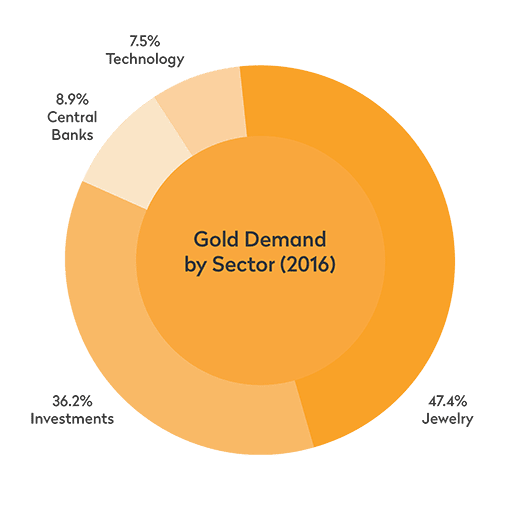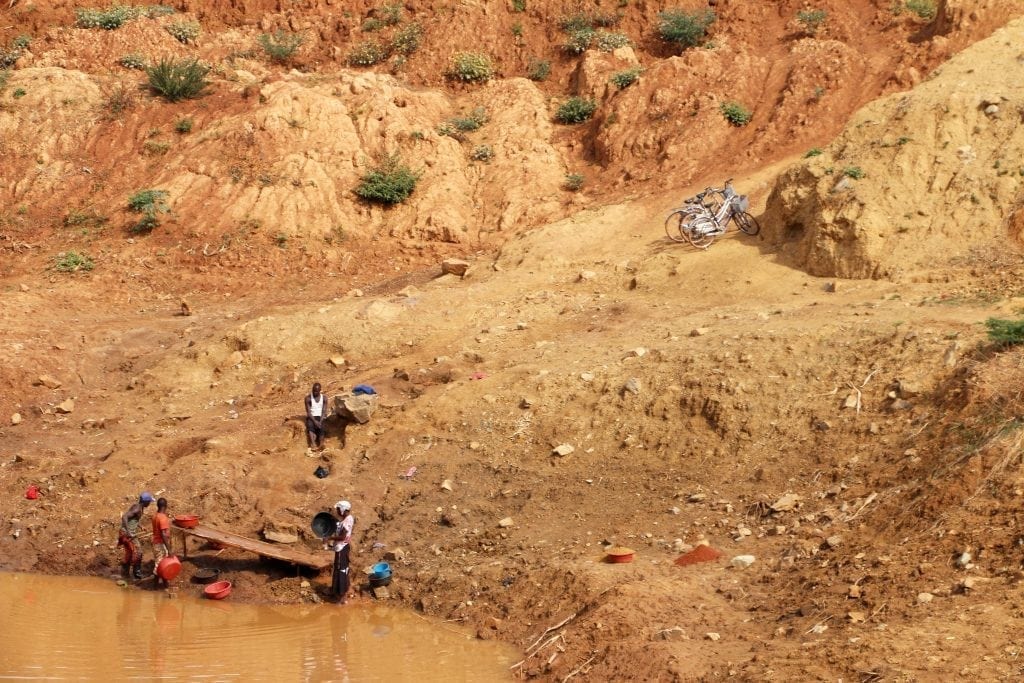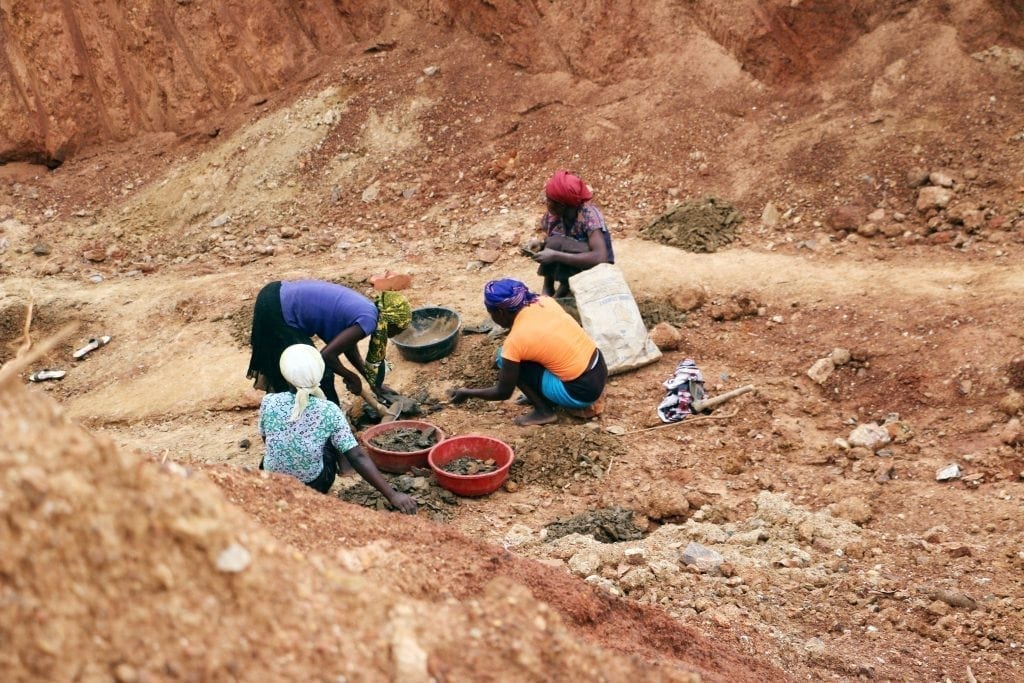Originally published at: https://www.fairphone.com/en/2018/09/11/building-foundation-for-responsible-gold-mining-in-uganda/
Responsible material sourcing has been at the heart of the Fairphone story since our early days as an awareness campaign about conflict minerals. This week, we’re pleased to share some noteworthy updates on one of our priority materials for supply chain improvements: gold.
Smelters added to list of suppliers
Our latest steps regarding gold clearly illustrate Fairphone’s two-pronged approach to improving supply chains. From the top down, we begin by gathering information to map all the different actors that contribute to making our phones… because as our value chain team likes to say, “you can’t change what you don’t know”.In the past, we’ve examined our gold supply chain from the perspective of individual components, such as tracing its path into our PCBs with our Chinese manufacturer. We also completed an extensive materials scoping study of 38 materials found in our phones, which helped us identify gold as one of the materials we want to keep focusing on in the years ahead – based on its importance for manufacturing phones, as well as the opportunities for improvement in the supply chain.
Most recently, we’ve published a new edition of our list of suppliers. After initially uncovering information about our final assembly manufacturers, component suppliers and sub-component suppliers, we’ve now dug a couple levels deeper to include a list of smelters as well. The expanded list discloses all of the (potential) smelters that our suppliers source from, focused specifically on the four recognized conflict minerals: tin, tantalum, tungsten and gold.Joint forces for more responsible gold
Our top-down mapping helps inform the other half of our approach to improvement: working from the bottom up to identify or develop best practices and positive mining initiatives and connect them to our supply chain. This part of our approach is especially important: while top-down mapping helps identify high level ‘risks’, we firmly believe that our efforts need to go beyond mitigating risks. That’s why we pro-actively look for opportunities to improve and create a positive impact, which often requires close collaboration with miners, as well as investments and time.For gold, we previously completed a small but innovative project to integrate Fairtrade gold from Peru into our supply chain. While we were very proud of the results of this project, we know that the amount of gold needed to produce the Fairphone 2 is too small to create a lasting difference in the gold supply chain. That’s why we’re excited to share the details about our most ambitious step yet for sourcing more responsible gold.
It all started last year, when we began contributing to the gold covenant, an initiative spearheaded by the Dutch Ministry of Foreign Affairs which aims to increase the supply of responsibly sourced gold. The covenant brought together a variety of parties with an interest in the gold sector, including commercial businesses, industry boards and non-profit organizations.
Mine in Busia, Uganda (February 2018).
Our discussions with other covenant participants resulted in something special: a new partnership focused on practical ways to create a more responsible gold supply chain. Besides Fairphone, the initiators include Hivos/Stop Child Labour (SCL), UNICEF, Fairtrade Foundation, and Solidaridad. RVO (Netherlands Enterprise Agency) is supporting our activities as a funding partner. It’s one of the first gold-related partnerships that’s bringing together NGOs and electronics manufacturers to address both ends of the supply chain, from mining to integrating the resulting gold into our products.For the first phase of our partnership, we aim to make tangible, short-term improvements, starting with sourcing more responsible gold from Uganda. We’re currently working with artisanal and small-scale mines (ASM) in Uganda to establish a sustainable, traceable gold supply chain that creates a better future for miners and their families, and can also serve as a blueprint for other projects.
Because of our commitment to influencing change in areas where it’s most needed, for us, it made sense to work in Uganda. The country has a long tradition in gold mining and a large concentration of artisanal and small-scale mines (ASM), but many of the mining activities are unregulated. Besides smuggling and environmental damage, the lack of regulation can lead to human rights abuses, including child labor. In fact, up to 30% of the workers in Uganda’s mines might be children.
Women working at a mine in Busia, Uganda (February 2018).
Therefore, to contribute to more responsible gold mining in Uganda, we must address a variety of interconnected factors. For example, we aim to tackle the issues at the root of the child labor – ranging from access to education to better incomes for adults. At the mines themselves, we want to increase economic prosperity with training and better mining equipment. And to ensure sustainable production and profits, we intend to provide long-term access to international markets. Throughout the course our activities, we will also evaluate and share our results to encourage other supply chains and industries to replicate our best practices and expand the overall impact.Each of the partners will play a different role in the process based on their area of expertise. Hivos/Stop Child Labour and UNICEF will focus primarily on the prevention and reduction of child labor. Fairtrade Foundation and Solidaridad will introduce improvements to increase gold miners’ incomes. Fairphone will pilot a new export model that connects the Ugandan gold directly to the electronics industry. In addition, as the key coordinator of the project, Fairphone will drive the overall program and align the different partners over the course of our collaboration.
Follow our journey to source fairer gold
The activities in Uganda are well underway, and last year we completed assessments to select the mine sites, communities and local partners who will participate in this project. Laura (our head of Value Chain) and I are currently in Uganda to participate in a festive kick-off event with local and international partners, as well as local government authorities.We invite you to follow along on our journey to learn more about our supply chain and source more responsible gold. To learn more, you can download our updated list of suppliers and read about the Uganda partnership on our landing page. You can also take a look at the evaluation from the Dutch Ministry of Foreign Affairs, published to mark the one-year anniversary of the signing of the gold covenant. We’re looking forward to sharing more about our insights and achievements regarding gold the months and years ahead.



